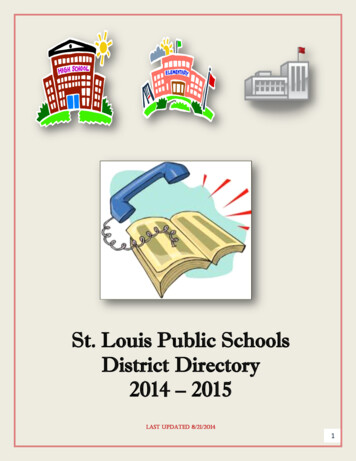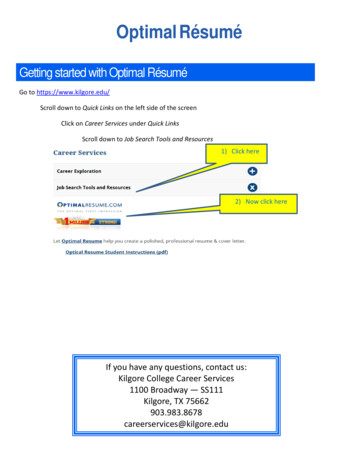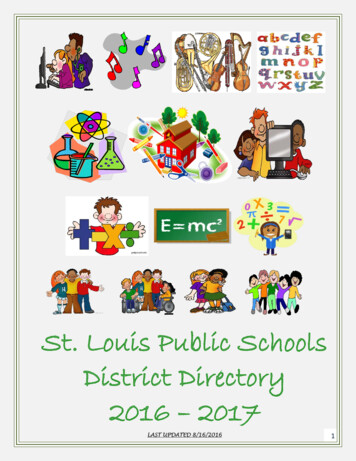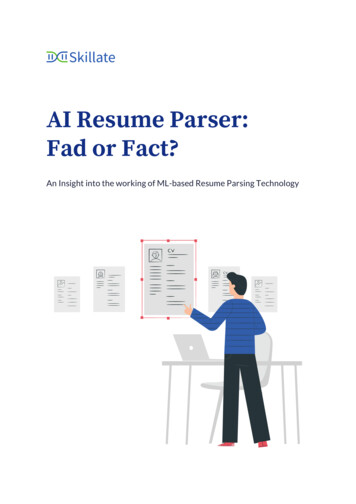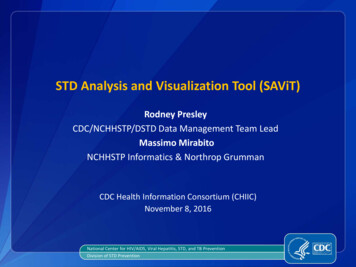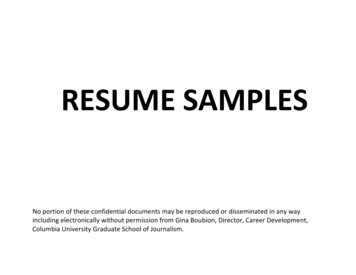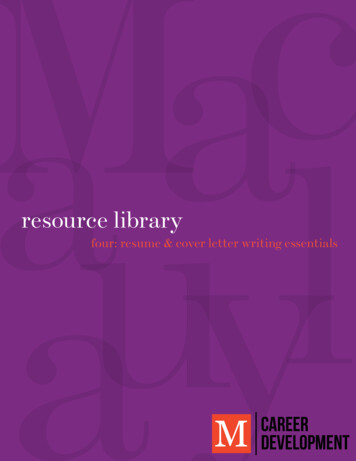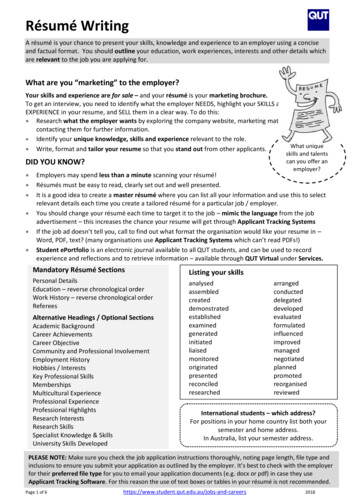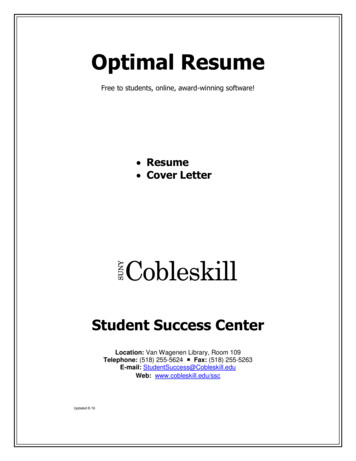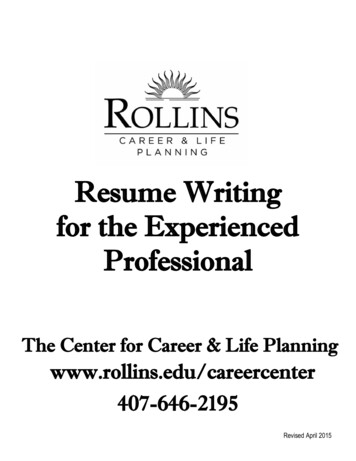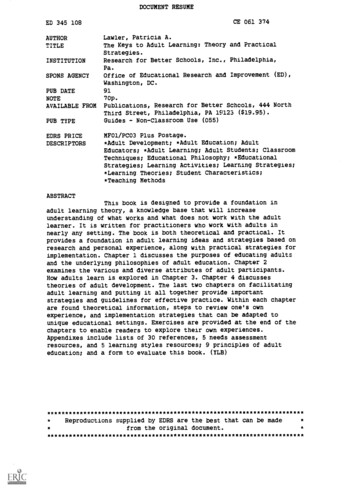
Transcription
DOCUMENT RESUMECE 061 374ED 345 108AUTHORTITLEINSTITUTIONLawler, Patricia A.The Keys to Adult Learning: Theory and PracticalStrategies.Research for Better Schools, Inc., Philadelphia,Pa.SPONS AGENCYOffice of Educational Research and Improvement (ED),Washington, DC.PUB DATENOTEAVAILABLE FROM9170p.PUB TYPEEARS PRICEDESCRIPTORSPublications, Research for Better Schools, 444 NorthThird Street, Philadelphia, PA 19123 ( 19.95).Guides - Non-Classroom Use (055)MF01/PC03 Plus Postage.*Adult Development; *Adult Education; AdultEducators; *Adult Learning; Adult Students; ClassroomTechniques; Educational Philosophy; *EducationalStrategies; Learning Activities; Learning Strategies;*Learning Theories; Student Characteristics;*Teaching MethodsABSTRACTThis book is designed to provide a foundation inadult learning theory, a knowledge base that will increaseunderstanding of what works and what does not work with the adultlearner. It is written for practitioners who work with adults innearly any setting. The book is both theoretical and practical. Itprovides a foundation in adult learning ideas and strategies based onresearch and personal experience, along with practical strategies forimplementation. Chapter 1 discusses the purposes of educating adultsand the underlying philosophies of adult education. Chapter 2examines the various and diverse attributes of adult participants.How adults learn is explored in Chapter 3. Chapter 4 discussestheories of adult development. The last two chapters on facilitatingadult learning and putting it all together provide importantstrategies and guidelines for effective practice. Within each chapterare found theoretical information, steps to review one's ownexperience, and implementation strategies that can be adapted tounique educational settings. Exercises are provided at the end of thechapters to enable readers to explore their own experiences.Appendixes include lists of 30 references, 5 needs assessmentresources, and 5 learning styles resources; 9 principles of adulteducation; and a form to evaluate this book. ***************************Reproductions supplied by EDRS are the best that can be made**from the original *******************************
FTHE KEYS TOEARNINGORYkCTICAL STRATEGIESMEWATRICIA A. LAWLER, ED.D.U.S. DEPARTMENT OF EDUCAnONOttwp Educationai Research and ImprovementEDMATIONAL RESOURCES INFORMATIONCENTER IERIC)r- This document has been reproduced asr ec eived t rpm the person or organizalionoriginating itMinor changes have been made to improvereproduction dua:ity---------------e Points of wew or opinions stated in this document do net necessarily represent officialOERI position or policy"PERMISSION TO REPRODUCE THISMATERIAL HAS BEEN GRANTED BY6914tTO THE EDUCATIONAL RESOURCESINFORMATION CENTER (ERIC1."35kRCH FOR BETTER SCHOOLSIORTH THIRD STREETDELPHIA, PENNSYLVANIA1-4107oreT NOV V.i.11,r
THE KEYS TO ADULT LEARNING:THEORY AND PRACTICAL STRATEGIESby Patricia A. Lawler, Ed.D.Research for Better Schools444 North Third StreetPhiladelphia, PA 19123(215) 574-9300, Ext. 280
This puNication is a product of RBS Researcil and Development Project, Keith M. Kershner, Director.Graphic art by Dan NeriWord processing by Peter Robinson and Carol Crociante 1991 Research for Better SchoolsPrinted in the United States of America
ACKNOWLEDGEMENTSI had been working with adult students for seven years when I began mydoctoral work in adult education. Reading the theory was like coming home towhat I knew was really important for me and for my students. I grew excited aboutthe underlying assumptions in adult learning because I knew they were real. Irealized I wanted more than anything to teach adults how to teach adults. MichelleWoods-Houston understood my aspiration and encouraged me to write it all down.John Fielder also understood and patiently edited my enthusiastic ramblings.P.A.L.
TABLE OF CONTENTSIntroductionChapter 1 - What's It All About Anyway?17Chapter 2 - Characteristics of Adult Learners11Chapter 3 - How Adults Learn17Chapter 4 - Adult Development23Chapter 5 - The Keys to Facilitating Adult Learning33Chapter 6 - Putting It All Together47References53AppendicesA - Needs Assessment ResourcesB - Learning Styles ResourcesC - Principles of Adult EducationEvaluation Form57596165
INTRODUCTIONMost of us have a picture of how to teach children. After all, we were allchildren at one time and have many memories of how teachers, good and bad,conducted their classes. From this experience we have some idea of how toproceed, even if the details are fuzzy.But when it comes to teaching adults, we are not as sure.Reflectiveeducators will question whether the teaching methods and techniques appropriatefor children make sense for adults. A classroom of children is in the same age anddevelopmental cohort, but adults show much more diversity. Teaching adults mayrequire a different teacher-student relationship. Unlike children, adults have a greatdeal of knowledge and life experience.How is learning facilitated when thestudents are the teacher's social and intellectual equals? And finally, adult learningseems so varied -- corporate classrooms, workshops, community center activities,university courses -- that the teacher of adults may wonder if there are any basicprinciples and concepts that can be used to facilitate adult learning with all of itsdifferent settings and audiences.Life-Long LearningAdults aren't like children and teaching adults isn't like teaching children.Adult learning has its own characteristics, methods, and approaches, which aneffective teacher of adults needs to know. A good place to start is with anunderstanding of the concept of life-long learning and the education of adults. Nomatter where we are, personally, in the educational system, at one time or anotherwe have been adult students, and at one time or another we also have beenresponsible for teaching, training, or facilitating learning for another adult.Life-long learning is a term coined during the '70s which describes thephenomenon of adult learning. Although adults have been "going to school"throughout nistory, it is only in the last 30 years or so that attention has been paidto the adult learner. Seeing that adults have the capacity to learn and change asthey grow older has contributed to a positive view of the adult student. The oldadage, "You can't teach an old dog new tricks," fell by the wayside as researchproved adults could and did learn throughout their lifetimes. As our societyincreased its pace of change, and technology created advance after advance,adult workers required more training and education to keep up. Educationbecame imperative to meet the continually changing needs of our new informationsociety. Life-long learning became a common expression to describe the needs ofthis society. It means that we have changed the way we view education, especiallyin the workplace.P
These changes in society also brought increased leisure, increased healthand longevity, increased illiteracy, and an increase in the disparity of social groupsin this country. Adults use each of these as reasons for training and education.Think back throughout your own adult years: what educational experiences haveyou had? Going beyond the formal classroom in college or graduate school, whatother educational everts have you participated in as an adult student?Each of us throughout adulthood has participated in a variety of learningactivities. Your list may be varied, or more focused, with different themes atdifferent times of your life. Starting a new career may mean participating in aseries of training seminars. Starting a family may mean books, seminars, andsupport groups to enhance the ability to parent and juggle all of ourresponsibilities. Approaching retirement may mean new learning experiences forcareer retooling or enrichment and leisure activities. This is evident in the largenumber of older adults seen on college campuses today, attending regular classesand special programs, such as Elderhostel.What is the thread that ties all of this diversity together? It is the fact thatadults are engaged in learning throughout their lives -- life-long learning. Forwhatever reason, in whatever place, adults today are the majority of receivers ofeducation. As practitioners, we have been given the challenge of designing anddelivering a program or class for a group of adults. Whether in the workplace orprivate life, we will be dealing with the adult as a participant or student. Thetechniques and methodologies we learned in the past as students ourselves or aspractitioners may not be suited to the adult population. We may have found theminadequate as instructors of adults. We may also have resented the approach ateacher or seminar leader has taken with us as students. There is a large body ofinformation about adults as learners, about how to teach adults, and what works inthe classroom with adults. This body of information is growing, some of it anexcellent resource, some of it a confusing melange of techniques. Where do westart?The Study of Adult LearningWe start by acknowledging that a study of adult learning is importantbecause adults are different from children, not only in age, but in experience,expertise, goals, and development. We start by acknowledging that there is abody of information based on research that can enhance our knowledge of whatworks in a classroom. And we start with our own experiences as adult learners.This book provides practitioners with a reasonable and practical place tostart. The book is designed to present a foundation in adult learning theory, aknowledge base that will increase understanding of what works and what does not2
work with the adult learner. It is written for practitioners who work with adults injust about any setting. The basic principles of adult learning can be useful whetherthe participants are teachers taking an in-service day, senior citizens attendingElderhostel, university faculty dealing with an increased adult population in theircourses, workshop planners in a community center, or trainers in a corporateenvironment.The book itself is based on an important principle of adult learning -- that anadult has a wealth of experience, one which can be a rich resource in learning. Asyou read through this book, you will have many opportunities to review your ownpersonal and educational experiences, from both the perspective of a student anda teacher or program designer. Take advantage of these opportunities to reviewwhat happened for you, what knowledge you have, how things worked for you.There are exercises to explore your own experiences as an adult learner, as well asresources for use in designing and implementing your own educational events foradults. For example, Exercise 1 provides the opportunity for you to explore theeducational activities you have participated in during your adult years.This book is both theoretical and practical. It provides a foundation based onresearch and personal experiences, along with practical strategies forimplementation. You will see that there is a foundation in adult learning ideas andstrategies which will enhance your work with adult participants. The importanttopics for understanding adult students are spelled out in each chapter. ChapterOne, "What's It All About Anyway?", discusses the purposes in educating adultsand the underlying philosophies of adult education. Chapter Two, "Characteristicsof Adult Learners", examines the various and diverse attributes of adultparticipants. "How Adults Learn" is explored in Chapter Three; and theories of"Adult Development" are discussed in Chapter Four. The last two chapters, "TheKeys to Facilitating Adult Learning" and "Putting It All Together", provide importantstrategies and guidelines for effective practice. Within each of these chapters youwill find theoretical information,steps to review your own experience, andimplementation strategies which can be adapted to your unique educationalsetting.The Purpose of this BookWhy is this book important? What purpose will it serve for you? First, asmore and more adults seek out educational opportunities to enhance their job andcareer opportunities, to enrich their lives, to facilitate transitions and significant lifeevents, and to change their economic destiny, practitioners have the responsibilityto design and deliver programs suited to the adult learner. With competitioncrowding in on us, with illiteracy a national problem, and with billions of dollarsallocated in business and industry for education, we have a need to know what3
works effectively and efficiently. Second, as responsible and dedicated educators,we care about the quality of instruction. Understanding the uniqueness anddiversity of the adult learner is crucial to providing a good learning event.What are your reasons for reading this book? What do you want out of it?What are your own expectations and needs? How will you use the ideas andstrategies concerning adult learning? Take some time to reflect on what you willbe looking for. Throughout the book you are asked to think about your ownexperiences. As you will see, as both an adult learner and educator, thisconsideration of personal experience is important in adult learning -- an example ofan effective strategy of working with the adult learner.Adult learners haveimportant contributions to make, and these questions and exercises will make useof their experience. They are also examples of techniques which you may want toincorporate as you construct educational events for adult participants.In the search for an effective approach to working with adults in theclassroom, the place to start is with our own philosophy of education. Inpreparation for the next chapter, complete Exercise 1.4
THE KEYS TO ADULT LEARNINGEXERCISE 1PERSONAL EDUCATIONAL HISTORYStarting with ourselves as adultlearners is a helpful way to understand theideas and concepts of adultlearning. We have all been adult learners atone timeor another.Think back over your adultyears and try to remember yourexperiences, both in the classroom and other educationalactivities. What are yourmost significant memories? In whattypes of classes or activities did youparticipate? What motivated you to sign up fora class or a course? Jot downsome of these memories.book.These experiences will be calledupon throughout the5i11
THE KEYS TO ADULT LEARNINGEXERCISE 1 (continued)PERSONAL EDUCATIONAL HISTORY0.IZI
CHAPTER ONEWHAT'S IT ALL ABOUT ANYWAY?Formal training in education usually includes a course in the philosophy ofeducation. Such courses provide exposure to the philosophical and historicalfoundations that permeate educational practice. Here is where we as studentsread about the goals and values that underlie the roles of teacher, student, andorganization, as well as establish a basis for methodology and curriculum. Acourse in philosophy can help us see why educators do the things they do.Philosophy and Adult EducationWhy take up philosophy in a study cf adult learning? Well, to be effectivepractitiwers, we need to start with what we believe in and how we view the world.It is important to get in touch with our basic value system, and what we think abouteducation. Without this foundation, our practice is groundless, and our strategiesdirectionless.Many of us who are teaching and training adults may not have had a coursein educational philosophy, nor the opportunity to read about why educators do thethings they do. In our professional capacity we may need to be pragmatic andutilitarian to be efficient and get the job done. So, when we have a task at hand,like designing an in-service workshop for 10th grade teachers or a seminar infinancial planning for senior citizens, we want to get right to it. Usually we are on atime-line, with deadlines just over the horizon. Taking time to reflect on ourphilosophy and how that impacts our practice may not be a luxury we have ordemand.However, such reflection can be important to teaching effectiveness. Forexample, Roger Hiemstra (1988) argued that it is very healthy for practitioners toreflect and question their personal philosophy and values in terms of professionalactions. He proposed that, as adult educators, we should undertake the exerciseof reviewing philosophy, values, and goals and creating our own personalphilosophical framework for professional practice. Hiemstra cited four reasons forthis exercise:A philosophy promotes an understanding of human relationships.A philosophy sensitizes one to the various needs associated with positivehuman interactions.A philosophy provides a framework for distinguishing, separating, andunderstanding personal values.7
A philosophy promotes flexioility and consistency in working with adultlearners.Merriam (1982) agreed with Hiemstra that philosophy can inform practiceand "directly affects curriculum and instruction" (p.91). She cautioned, "One'sview of the adult learner, the learning process, and the goals of adult educationguides the selection of content and the planning of instruction" (p.91). Darkenwaldand Merriam (1982) pointed out, "Whether or not it is articulated, a philosophicalorientation underlies most individual and institutional practices in adult education"(1137).The Major Philosophical Conceptions of Adult EducationThis need for a grounding in philosophy is vital for effective practice becauseit helps us understand what drives us in our work. There are a number of majorphilosophical directions in adult education. These directions are based onphilosophical systems which are the foundations for all education, but for ourpurposes we will link them only to adults and adult education. Darkenwald andMerriam (1982) described five directions:Cultivation of the Intellect This direction is best described as traditionalThe curriculum emphasizes the liberal arts and theeducation.development of intellectual powers of the mind. Content is important.The teacher is the authority and there is little interaction between teacherand student. Education is seen as a neutral activity divorced from socialaction. The Great Books Program illustrates the emphasis on liberaleducation with its study of the classics.Personal Development -- This direction is drawn from the humanist andexistential movements of the '50s and '60s.Education is seen aspromoting individual growth and development. Content is whatever willpromote that growth. The student is the focus of the learning process andgroup interaction is the favored instructional mode. This direction isevident in human development or human potential seminars as found incorporate training programs, life change programs, and in encounter-typegroups and cooperative activities in many diverse educational settings.Personal and Social Improvement -- This progressive view of education isbased on the writings of John Dewey and has had a strong influence onAmerican educational philosophy. Content is drawn from the student'slife experiences and problem solving is the instructional mode of choice.Teachers and students are partners in the task of learning. The aim ofeducation is to develop the student so that he/she may become a better84
member of society. Two examples of this direction are Americanizationeducation and the community education movement. In the past,educators have sought to "Americanize" new immigrants focusing on"citizenship training." Today with our new wave of immigrants, the focusis on literacy and job skills, such as the ESL programs.Radical Social Change -- This direction is unique to adult education;education is seen as value laden and never neutral. The content comesfrom the learner's consciousness, where the learner is seen as oppressedand disadvantaged. The teacher also is a learner in this educationalprocess and never one who simply "deposits" information in the minds ofthe students. Methodology is seen as a dialogical encounter that leads toreflective thought and action. The aim of education is to bring about newsocial order and change. Education is seen as closely connected withsocial, political, and economic understanding of cultures, and with thedevelopment of methods to bring people to an awareness of responsiblesocial action. Although this direction is not pervasive in American adulteducation, it's impact is felt mainly in the adult literacy programs, wherelearning to read is seen as an avenue to change.Organizational Effectiveness -- A large segment of American adulteducation, especially in business and industry, is concerned withorganizational effectiveness, which in turn promotes profitability. As boththe public and private sectors strive to become more efficient deliverers ofgoods and services, there is an expansion of human resourcedevelopment and training in the workplace. Within this framework,educational programs are designed to achieve the organization's goalsand enhance its effectiveness. The goal of most training is behaviorchange, and the theories of behaviorism have greatly influenced thisdirection.These directions provide different conceptualizations for describing thepurposes and goals of education for adult students. They also can be theframework for designing programs based on a particular view of the adult learnerand the purpose of education.Developing Your Philosophy of EducationMost of us have been exposed to these philosophical directions, and ourown philosophy may reflect a hodgepodge of philosophical ideas and aconglomeration of values. What is important is identifying and understanding whatdrives both our own educational perspective and that of the organization withinwhich we work. A firm understanding of what is important to us and a clear view of9
adult students and their education can provide a grounded purpose and guidelinesto facilitate our work.How would you define your philosophy of education? When working withadult students, whether it's in a staff development seminar or a graduate course,what purpose underlies your program design and teaching? Why continue toeducate people during their adult lives? What is important for a student in aneducational environment? What are our obligations, as facilitators of learning?What theories and philosophical systems have impressed you? Who hasinfluenced your thinking on the purpose and aims of education? Take some timeto reflect on your own philosophy and what drives your own individual practice.Thinking about the philosophical perspectives presented in this chapter,which one best describes your own thoughts? Are you eclectic in your approachto education, or do you adhere to one ideology? Which one of the philosophicalThis reflective processdirections best fits you, best fits your organization?provides the opportunity to be specific about your purpose for education, your roleas a teacher, and your goals for teaching.Implications for PracticeWhat implications does this reflective process have for practice? What is thepractical side of reviewing philosophy and values? First, many adult educators seethis reflection as an important process for gaining an understanding aboutthemselves and their work. Second, in our busy lives we can make decisionsmore efficiently and effectively if we are clear on what drives our practice. Third, wecan see whether or not our philosophy is in line with good principles of adulteducation. As we go through this book, we will be creating criteria for goodpractice based on research and experience. Understanding how these criteria fitwith philosophy is important in selecting the best methodology for working withspecific adult audiences.Let's turn now to that audience. Who are the adult learners? What makesthem different? And what do they want from education?10le
CHAPTER TWOCHARACTERISTICS OF ADULT LEARNERSAt first it may seem easy to distinguish an adult student from a youngerlearner -- just look at the difference in years. But the difference goes beyond ageand years. This chapter examines adult learners and what makes them differentfrom younger students. It outlines important principles based on these differenceswhich can guide program development and instruction.Think for a moment about adulthood. What makes an adult different from achild? We know that adults are older than children, that they have responsibilitiesin their work, families, and community, which children do not have, and that theyare in charge of their lives. Adults are defined by legal descriptions, i.e., votingage, drinking age, by the roles they take on, by the life tasks they have. Perhaps,more important for our purposes, adults are capable of complex consciousprocesses. In Chapter Four we will take a look at the notion of growth, change,and development in adulthood. For now, we will include in the definition of anadult that they have the capacity to grow and develop beyond the physicaldimensions associated with growth in childhood. In what ways are you differentfrom when you where a child or a teenager? Exercise 2 asks you to list all theways you are now different as an adult. Think about what these differences meanfor program development and teaching.These differences are important in the design and development ofeducational events for adults. So many classes, seminars, workshops, andtutorials are based on traditional educational methodology. Memorization, lecturelarge classes, and minimal involvement seem to be the "tried and true" wayseducate. Critics have been quick to point out over the years that this methodoloymay be ineffective. As students, we may have found these methods boring,intimidating, and hard. Now, research in the field of adult education is showingthat the old methods are inappropriate for adults, and perhaps for young studentsas well!Characteristics of Adult LearnersAdults participate in a great variety of educational activities, from formalizedcollege classes to self-initiated learning events. What are some of the commoncharacteristics of adult learners? As an adult learner, how would you characterizeyourself? During the past few years have you participated in a class or workshopthat was uniquely adult education? As the characteristics of adults are discussed,consider your own experience. Chapter Five will show how to incorporate effectivestrategies into instructional methods and program design based on thesecharacteristics:11
Adults have many roles and responsibilities in their lives, education beingonly one, and usually not the major task at the time of its undertaking. Incontrast, children and youth have education as their major responsibility.Adults are usually motivated by a pragmatic desire to immediately use orapply their knowledge or skill. As children, we learn Information and skillswhich build over the years, preparing us for our future adult roles.Adults are usually prompted by a transitional event in their lives to seekeducation. Events such as divorce, job change death, or moving, can becited as reasons for learning. Children and youth have a formalizededucation plan that proceeds without much influence from transitions intheir lives.Most adults attend an educational event voluntarily. Children and youthusually have compulsory education.Malcolm Knowles (1980) specifically cited four assumptions about adultlearners that place them apart from children and youth. His famous ideas on"andragogy," the assumption that adults learn differently from how children learn,are still influential today in the field of adult education. He characterized adultlearners as:having a self-concept which moves from being one of a dependentpersonality toward being a self-directed human being;accumulating a growing reservoir of experience that becomes anincreasingly rich resource for learning;orienting their readiness to learn to developmental tasks of their socialroles;changing their perspective from one which postpones the application ofknowledge to one which sees the immediacy of knowledge application(pp.44-45).Implications for PracticeWhat do these characteristics mean for the task of working with adultstudents? They mean that we must understand the unique character of adults.Adults are a diverse group of students. They come to an educational event for avariety of reasons. They are interested in connecting their educational experiences12IcL
with their life tasks. They are, for the most part, looking to education to fill a gap intheir lives and meet immediate needs.Take a look at the reasons you, an adult, have turned to education. Thinkback over the past few years and the educational activities, both formal andinformal, in which you took part. Did you participate in staff developmentworkshops, read a book on becoming a better personal financial manager, workthrough a word processing tutorial on the computer, attend a graduate course atthe university, or join a book discussion group at church? What were your reasonsfor signing up and attending, for taking on these various educational tasks? Inreviewing examples from your own experience, can you see the diversity of adulteducation and the diversity of reasons for participating?Needs AssessmentIn beginning to develop programs and classes for adults, you will need topay close attention to your students' needs.What are the reasons adultsparticipate? As you think about your own reasons for engaging in an educationalactivity, you may see that they are goal oriented, fulfilling an immediate career orpersonal need. Understanding the reasons adults participate and assessing theirneeds is an important first step in successful program development. Whetherdirected to instruct a prepackaged seminar or create an entire staff developmentproject, whether the contact with participants is two hours or two years, being intouch with what an adult student wants and needs is crucial.Needs assessment in itself can be an overwhelming topic an
responsible for teaching, training, or facilitating learning for another adult. Life-long learning is a term coined during the '70s which describes the. phenomenon of adult learning. Although adults have been "going to school" throughout nistory, it is only in the last 30 years or so that attention has been paid to the adult learner.
